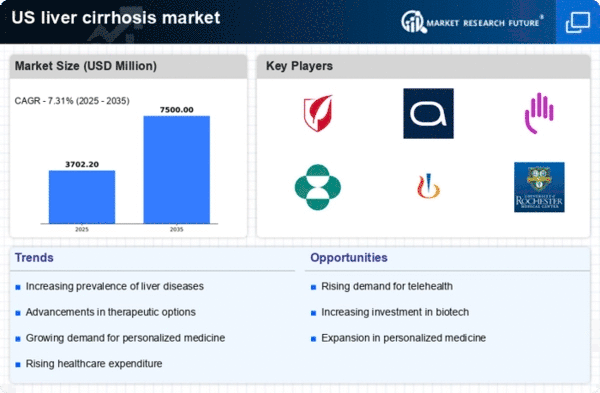Growing Awareness and Education
There is a notable increase in awareness and education regarding liver health and cirrhosis among the general public and healthcare professionals. Campaigns aimed at educating individuals about the risks associated with liver diseases, including lifestyle modifications, are gaining traction. This heightened awareness is likely to lead to earlier diagnosis and treatment of liver cirrhosis, positively impacting the liver cirrhosis-treatment market. Furthermore, healthcare providers are increasingly prioritizing liver health in their practice, which may result in more patients receiving timely interventions. As awareness continues to grow, the demand for effective treatment options is expected to rise.
Increased Healthcare Expenditure
The rising healthcare expenditure in the United States is a significant driver of the liver cirrhosis-treatment market. With healthcare spending projected to reach approximately $6 trillion by 2027, there is a growing focus on chronic disease management, including liver cirrhosis. This increase in funding allows for more research and development of new therapies, as well as improved access to existing treatments. Additionally, as insurance coverage expands, more patients are likely to seek treatment for liver cirrhosis, further stimulating market growth. The financial commitment to healthcare indicates a favorable environment for advancements in the liver cirrhosis-treatment market.
Advancements in Medical Technology
Technological advancements in medical devices and treatment methodologies are transforming the liver cirrhosis-treatment market. Innovations such as non-invasive diagnostic tools and improved imaging techniques enhance early detection and monitoring of liver cirrhosis. Furthermore, the development of novel drug delivery systems and minimally invasive surgical procedures is likely to improve patient outcomes. The integration of artificial intelligence in treatment planning and patient management may also streamline processes, making treatments more efficient. As these technologies evolve, they are expected to drive growth in the liver cirrhosis-treatment market, providing healthcare professionals with better tools to manage this complex condition.
Rising Prevalence of Liver Diseases
The increasing incidence of liver diseases, particularly liver cirrhosis, is a primary driver of the liver cirrhosis-treatment market. According to the Centers for Disease Control and Prevention (CDC), liver disease is among the leading causes of morbidity and mortality in the United States. The prevalence of conditions such as hepatitis C and alcoholic liver disease contributes significantly to the rising number of cirrhosis cases. As the population ages and lifestyle factors such as obesity and alcohol consumption persist, the demand for effective treatment options is likely to grow. This trend indicates a robust market potential for pharmaceutical companies and healthcare providers focusing on innovative therapies and management strategies in the liver cirrhosis-treatment market.
Regulatory Support for Innovative Treatments
Regulatory bodies in the United States are increasingly supportive of innovative treatments for liver cirrhosis, which is a crucial driver for the liver cirrhosis-treatment market. Initiatives aimed at expediting the approval process for new therapies, particularly those addressing unmet medical needs, are becoming more common. This regulatory environment encourages pharmaceutical companies to invest in research and development, leading to a more diverse range of treatment options for patients. As new therapies receive faster approvals, the market is likely to see an influx of novel treatments, enhancing the overall landscape of the liver cirrhosis-treatment market.














Leave a Comment